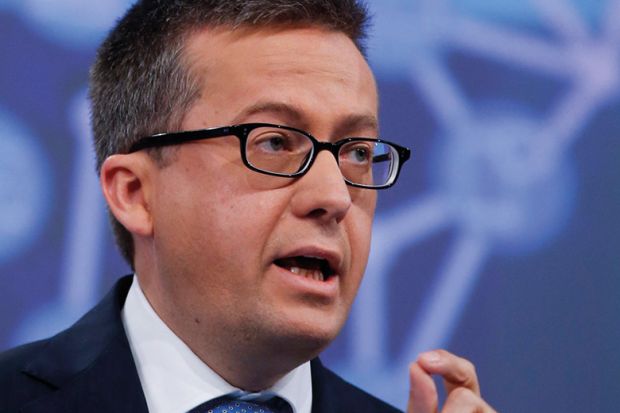“Europe needs the UK and the UK needs Europe” when it comes to science, according to the European Union’s commissioner for research, science and innovation.
Carlos Moedas spoke to Times Higher Education after giving a speech at the University of Cambridge on 3 March.
Jo Johnson, the UK’s universities and science minister, also spoke at the event, warning that voting to leave the EU would put “our status as a science superpower at risk”.
The speeches came as the UK prepares for its referendum on EU membership, to be held on 23 June.
Speaking to THE, Mr Moedas stressed that he would “not get into any internal debate – I can talk about the benefits [for] every country from being part of the European project on science.
“I think that today…there’s no way that any country alone or any scientist alone could do excellent science. Excellent science is about collaboration.”
In his speech, the Portuguese said that “Einstein was the sole author of his papers”, but the recent paper announcing the detection of gravitational waves “had more than 1,000 international authors” and the first Higgs Boson paper “had over 5,000”.
He added: “The big breakthroughs that will contribute to Europe’s knowledge economy − and to solving global challenges − will not be from one person, or one university or one nation. They will be global.”
The commissioner continued: “The UK is an essential and valued partner in all of the EU’s essential international research collaboration. And the UK’s research is strengthened by its relationships with the EU and the international community.”
Mr Moedas said of the multi-authored gravitational waves and Higgs Boson papers: “That’s what we mean about European science, that European science is a benefit that goes beyond the amount of money [in EU research programmes].
“It’s a very important amount of money, but it goes beyond that because it’s about the network effects…That’s why science has to be a European endeavour, a global endeavour.”
More broadly in terms of the European exchanges created by EU programmes, he singled out the Erasmus+ student mobility programme.
“I probably would rank one of the best projects ever of Europe as the Erasmus programme…I participated in the first Erasmus programme of my country and that changed my life forever,” Mr Moedas said.
In terms of the UK’s contribution to European research, Mr Moedas said: “The UK contribution is recognised by everybody. The UK is [also] one of the major beneficiaries of the EU programme.”
He said the reason for this was that “in the UK you find the best of the best in terms of science”.
Mr Moedas added: “I think that Europe needs the UK and the UK needs Europe in [the] case of science.”
In his speech, Mr Johnson said: “To thrive in the information economy we need to be open to the world, we need to be innovative, and we need to be building academic partnerships with our close neighbours, not turning our backs on them.”
He acknowledged that UK science “could survive and prosper outside” the EU. But the minister added that “those who want to leave must explain how they will sustain the same levels of investment and the same depth of partnership if we were outside the EU”.
Register to continue
Why register?
- Registration is free and only takes a moment
- Once registered, you can read 3 articles a month
- Sign up for our newsletter
Subscribe
Or subscribe for unlimited access to:
- Unlimited access to news, views, insights & reviews
- Digital editions
- Digital access to THE’s university and college rankings analysis
Already registered or a current subscriber? Login





